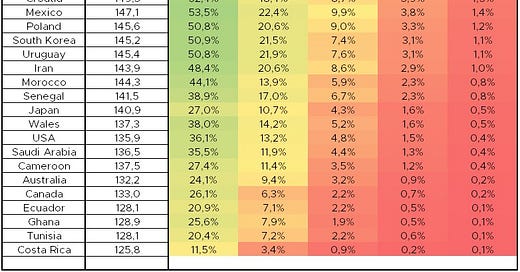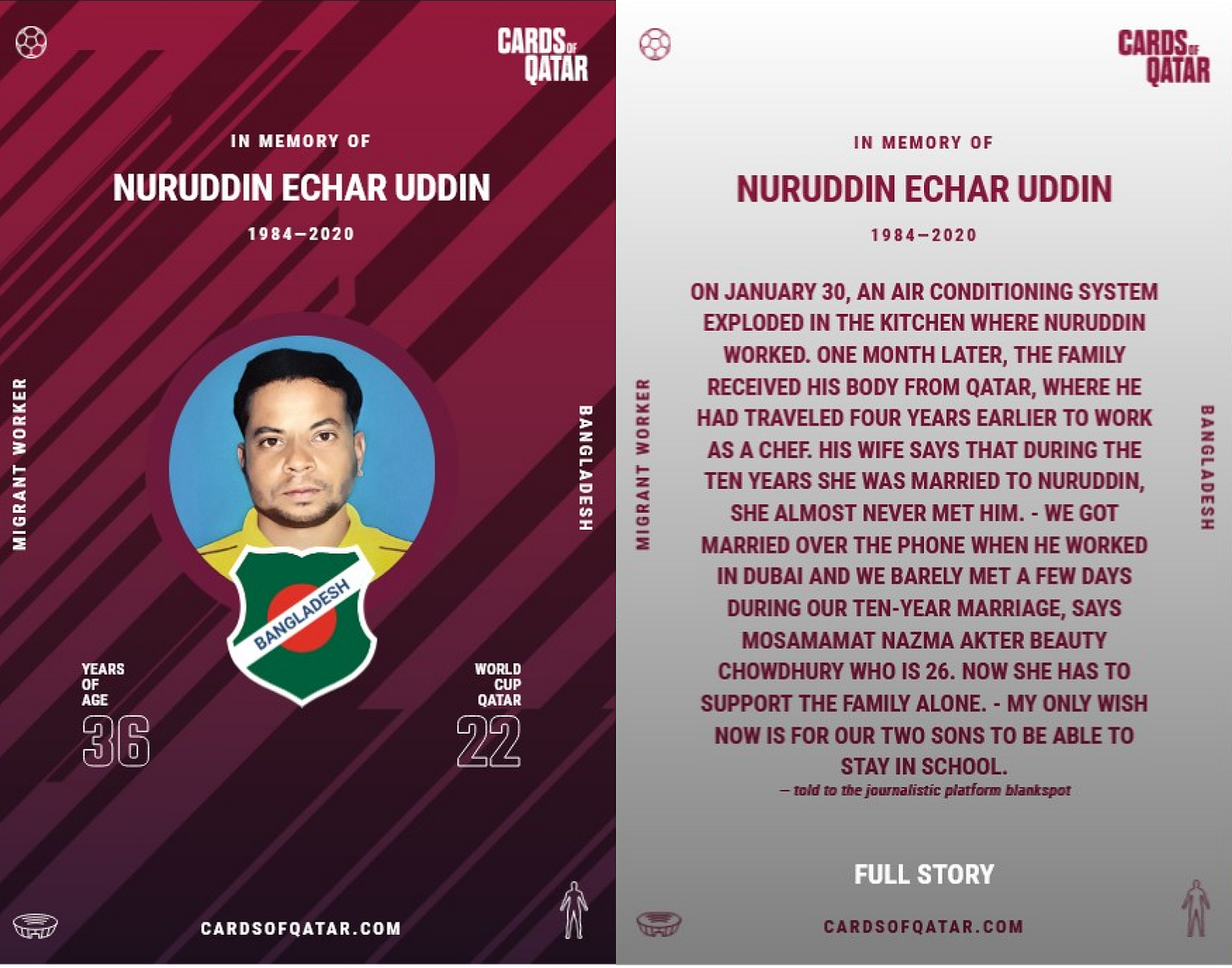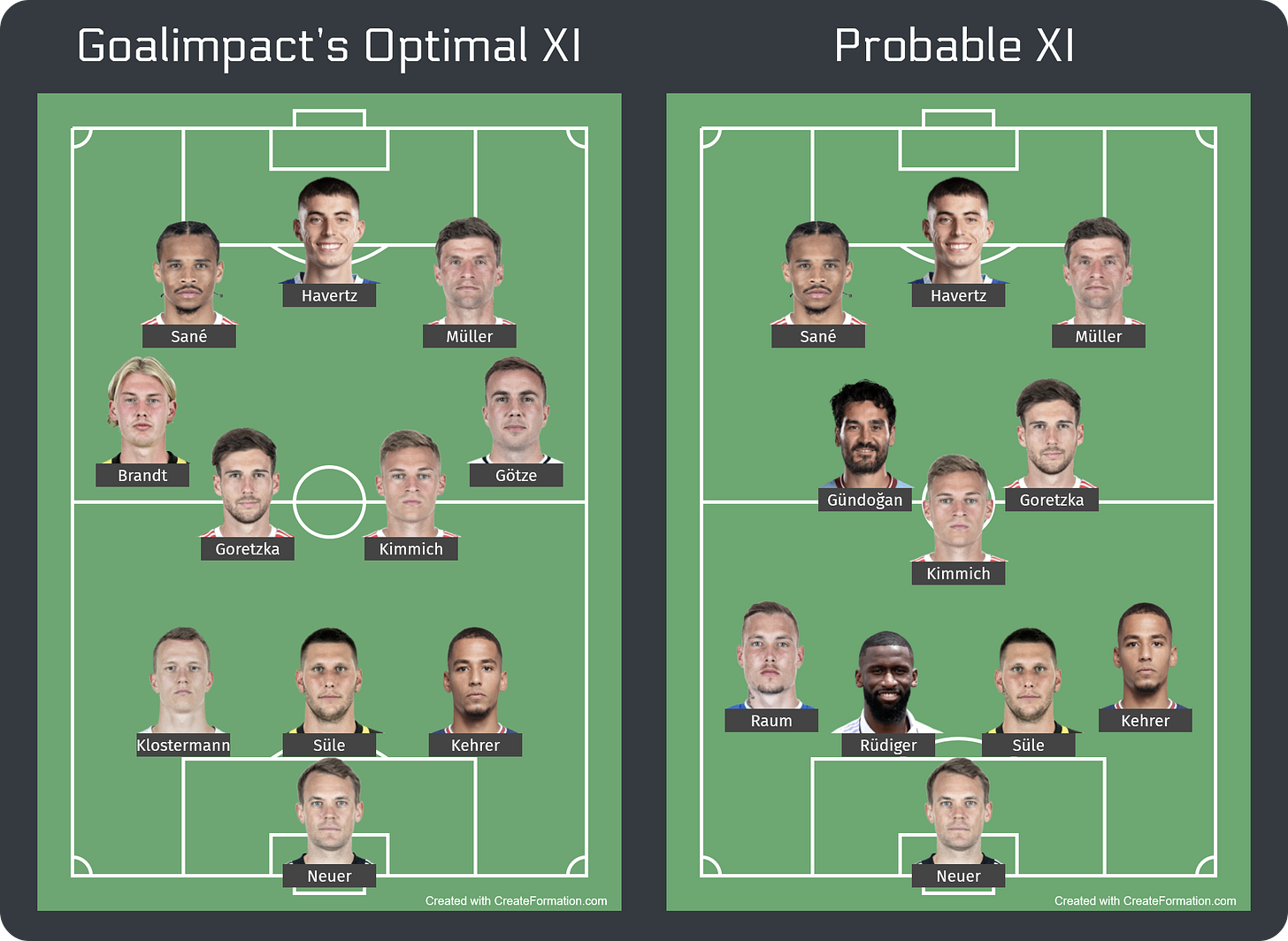How we handle the WC22 politically
The decision of the FIFA to grant the organization of the world cup to an autocratic country that does not honor even basic human rights and that is openly opposing FIFA's own values puts the football fans worldwide, the players, and us into a dilemma.
Should we celebrate our sport and ignore the human rights violations and thousands of dead construction workers? Or should we ignore the tournament out of respect for the people that lost their lives and to avoid being part of a sportswashing event and punish players like Niclas Füllkrug for whom this is the greatest moment of his career and that did nothing wrong?
It's not an easy question to answer and everyone will come up with their own answers to it. We at Goalimpact decided to put the dilemma openly on the table. We will
not write or speak about the event without remembering the people that died. Not abstractly, but real persons with their real names as found e.g. here (https://cardsofqatar.com/en/the-cards/).
Not mention the name of the land it takes place
Thus this article is dedicated to Nurrudin Echar Uddin.
Rest in peace.
And believe me, it was not morally pleasing to write an article about the upcoming tournament.
The predictions
Since the genesis of Goalimpact started with the European Championship in 2004, where Jörg expected Greece to be much stronger than all of his colleagues, we continue our Story by predicting the upcoming world cup. Based on the national squads and their optimal XI + (and subs) our predictions look as follows.
What strikes is the high Goalimpact value of Germany, especially considering their last embarrassing participation in the EC 2020, where they did not advance through the group stage (more about Germany below). The second best-rated team by the Goalimpact algorithm is current World-Champion France. We envision the winner of the upcoming tournament will be either Germany or France in one of three cases.
Behind these two favorites are the usual suspects such as Spain, Belgium, Netherlands, England, Portugal, and Brazil with similar team strengths (160 to 166). Interestingly, we expect Denmark to have similar chances to win the tournament (5.9%) to Brazil (4.8%). All other nations have a percentage below 3% of winning the tournament. Even Messi and the Argentinians are not considered highly probable WC winners according to our model.
In contrast, the betting market assumes that the two main aspirants for winning the world cup are actually Brazil (~20%) and Argentina (15%). Germany gets around a 9% chance of winning the cup. Do the bookies know something our model is ignorant of? It might be that players used to hotter climates are slightly underrated. However, the differences between our and the bookie’s model are too extreme (~15%) to solely justify them on weather conditions. It will be interesting to see who is closer to the real outcome. But what is interesting is that the most probable failure for the bookie’s favorite Brazil is to lose against Portugal in the Round of 16 (11%) or Germany in the quarter-finals (9%).
Germany - A sleeping giant awakened by Flick?
Goalimpact-wise, Germany has the best players and is thus “a sleeping giant”. However, having the best squad doesn't necessarily transform into being the best team. Although our main assumption is that football is a player’s game, it is essential for the individual players to be integrated into a cooperative and functional organization. Our speculation is that Löw, especially in the last years did not form an adequate team and hence the players were not performing at their expected level.
It might be no coincidence that when Hansi Flick, the current German coach, left 2016 the national team as an assistant coach, their achievement dramatically declined (eliminated in the group and round of 16). In contrast, with Flick as part of Germany's coaching staff (2007 till 2017), Germany was the world champion in 2014 and reached at least the semi-finals in every international tournament. Also with Bayern Munich Flick won 7 titles in two seasons with an incredible points-per-match ratio of 2.53. Maybe he might be the missing puzzle to create a great german team out of already world-class individuals.
However, that brings about the question of “what is actually a good team?”. This question is point to the Achilles heel of our Model.
Why Optimal XI is not necessarily Starting XI?
It is important to notice, that the predictions are based on the Optimal XI team. What do we mean by Optimal XI? Because Goalimpact does not know the real Starting XI, it assumes that the best players play. Thus Goalimpact does not include the decision of the coach, who founds his decision upon other factors sympathy, current trend, synergies within the team, and tactical formation. As a consequence, there can be strong deviations between the starting XI and Goalimpacts Line-Up. This is most evident, considering the tactical system of a team. Goalimpact does not take into account what formation is probably played. Even though our Optimal XI is selected with rules such as including a Goalkeeper and at least three defenders, three midfielders, and one striker, the real formation might differ. Hence our player selection might end up in a team with for example no left back-up, or no central midfielder.
This can be exemplified by looking at the Germans starting eleven.
We can expect, that Götze, Klostermann, and Brandt might not be probable starters. Rather one would have to add Rüdiger, Raum, and Gündogan. (Raum is currently not even considered to be a sub by Goalimpact). Hence the deviation for the Optimal XI (187) and Probable XI (179) is about 8 points. With that manual adjustments, the Germans still would be the best team, however, the probability to win will decrease.
(Note: In that scenario, only Germany was modified and all other teams still have mismatch between Starting and Optimal XI. Consequently, all other teams’ Goalimpact would decrease as well. Therefore the Optimal XI is still a good proxy for estimating relative team strength.)
Furthermore, the current Goalimpact predictions assume that a team's strength is the average of all players, and implies that each player contributes equally to the team's strength. This premise is reasonable, but there could be scenarios in which the extremes, the best & the weakest player, contribute more to the outcome of the game than an average player. Malcolm Gladwell, the best-selling innovative author, expects that because "... Soccer is a game of mistakes... the best way for a soccer team to improve then is to spend more on pretty good players instead of less on one excellent player.” This is known as the weak link hypothesis. Thus replacing your weakest player might turn out to be the most effective strategy to improve a team. (Contrary to Basketball, where the effect is probably reverse - the strongest player might have the most significant impact.)
BTW Goalimpact will explore this hypothesis next year.
For now, we can only speculate, that team strength is better described by low performers rather than by the Goalimpact team average.
Independent of all theory, reality will tell us how good our prediction truly was.
That said - We still put most of our eggs in the German basket.
What is Goalimpact?
Goalimpact measures the influence of a player on the goal difference.
It is thus a risk management tool for signing football players.
For more about Goalimpact see here or call us online right away.








More historical and deepful database from Germany players in comparison to other Euro countries (and especially South American countries) doesn't make it unfair to the rest?
Admittedly, I dont know the decisive parameters of your algorithm, but just from my subjective point of view the calculated optimal XI seems like a rather bad joke.
Götze and Brandt as "Schienenspieler"? Müller over Musiala who arguably has been one of the best players in the world for months now? Klostermann and Kehrer as central defenders over Rüdiger?